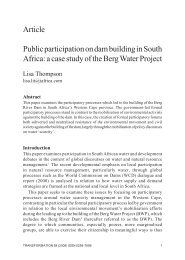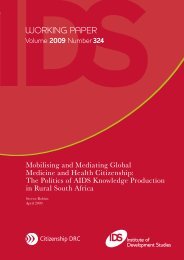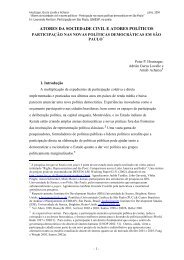Associations and the Exercise of Democratic ... - Citizenship DRC
Associations and the Exercise of Democratic ... - Citizenship DRC
Associations and the Exercise of Democratic ... - Citizenship DRC
Create successful ePaper yourself
Turn your PDF publications into a flip-book with our unique Google optimized e-Paper software.
IDS WORKING PAPER 285In large countries, where sharp regional variation in government presence <strong>and</strong>political practices are common, important causal relations can be masked instatistical analyses conducted with national-level data, as <strong>the</strong>se average highvariations in <strong>the</strong> values <strong>of</strong> important explanatory variables. This is a particularlysignificant concern in countries where enclaves <strong>of</strong> <strong>the</strong> authoritarian clientelismassociated with ‘low intensity democracy’ coexists with regions where governmentdoes far better at enforcing civil or political rights <strong>and</strong> producing public goods for<strong>the</strong>ir realisation (O’Donnell 1993; Fox 1994; Foweraker <strong>and</strong> L<strong>and</strong>man 1997). Subnationalunits such as large urban centers constitute a universe with a higherdegree <strong>of</strong> internal homogeneity than national units <strong>and</strong> reduce this heterogeneityproblem (Snyder 2001). In <strong>the</strong> particular cases <strong>of</strong> Brazil <strong>and</strong> Mexico, <strong>the</strong> vigorous<strong>and</strong> pluralist associational sphere that is hypo<strong>the</strong>sised to influence citizenship, <strong>and</strong><strong>the</strong> background condition <strong>of</strong> a relatively effective government presence, aredistributed in a highly uneven manner across national territory, <strong>and</strong> in particular inrural areas. Hence <strong>the</strong> selection <strong>of</strong> <strong>the</strong> two cities where <strong>the</strong>se two factors arestrongly present is more appropriate than <strong>the</strong> selection <strong>of</strong> national units.São Paulo <strong>and</strong> Mexico City are most likely cases, if <strong>the</strong> generalisations based on<strong>the</strong> experience <strong>of</strong> affluent democracies do not hold in <strong>the</strong>se cases <strong>the</strong>y will bepowerfully undermined (George <strong>and</strong> Bennett 2005: 120–1). The cities have <strong>the</strong> kind<strong>of</strong> substantial government presence that is considered a virtual prerequisite for <strong>the</strong>possibility <strong>of</strong> high quality citizenship <strong>and</strong> vigorous associational sphere (Linz <strong>and</strong>Stepan 1996: 37; O’Donnell 1993; Diamond 1999). For example, coverage <strong>of</strong>municipal water supply <strong>and</strong> sanitation is close to 98 per cent <strong>of</strong> households. And<strong>the</strong> associational sphere is considered vibrant <strong>and</strong> substantial in both cities. On <strong>the</strong>o<strong>the</strong>r h<strong>and</strong>, Brazil <strong>and</strong> Mexico are middle-income countries which differ substantiallyfrom <strong>the</strong> affluent industrial democracies in which most existing research has beenconducted. As important urban centers in <strong>the</strong>se countries, São Paulo <strong>and</strong> MexicoCity <strong>the</strong>refore provide a good test for <strong>the</strong> generalisations based on this research,exactly because <strong>the</strong>y represent a different type <strong>of</strong> context. The two countries arerecent democracies, share long legacies <strong>of</strong> authoritarian rule <strong>and</strong> social relations,<strong>and</strong> have associational spheres that until recently were dominated by corporatistassociations under high levels <strong>of</strong> state control. Fur<strong>the</strong>rmore, <strong>the</strong> cases are locatedin countries that over <strong>the</strong> past three decades have seen <strong>the</strong> gradual emergence <strong>of</strong>competitive democratic institutions <strong>and</strong> pluralist associational spheres.The political institutions <strong>and</strong> associational spheres in <strong>the</strong> two cities do, however,vary in important ways. The cities have different political histories <strong>and</strong> have playeddistinct roles in <strong>the</strong> national political life <strong>of</strong> <strong>the</strong>ir respective countries. At <strong>the</strong> time<strong>of</strong> <strong>the</strong> survey, Brazil <strong>and</strong> Mexico were also at different moments in <strong>the</strong>ir respectivedemocratic trajectories: in <strong>the</strong> former democratisation involved a transition frommilitary rule, <strong>and</strong> a pr<strong>of</strong>ound reform <strong>of</strong> <strong>the</strong> its historically weak <strong>and</strong> fragmentedparty system (1979), <strong>the</strong> writing <strong>of</strong> a new constitution (1988), <strong>and</strong> <strong>the</strong> first postmilitarydirect election <strong>of</strong> president in 1989; in <strong>the</strong> latter, democratisation involveda move from a one-party dominant regime to a multiparty regime, in which twoopposition parties became significant political contenders <strong>and</strong>, with reforms <strong>of</strong> <strong>the</strong>electoral system, won political power at <strong>the</strong> national level in 2000 for <strong>the</strong> firsttime. The variation democratic trajectory <strong>and</strong> timing between <strong>the</strong> countries, <strong>and</strong> in<strong>the</strong> role <strong>of</strong> <strong>the</strong> respective cities, provides a fur<strong>the</strong>r test <strong>of</strong> any generalisations aboutassociations’ citizenship effects.20





